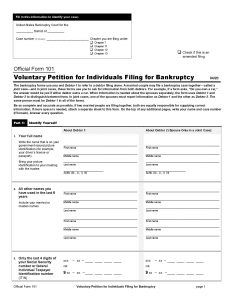If you are in the midst of a lawsuit and experiencing financial hardship, filing for bankruptcy may seem like a quick fix that will prevent judgment against you. In some cases, that may be true, but there are many types of lawsuits that filing for bankruptcy will not prevent from moving forward.
We discussed the affect bankruptcy could have on civil litigation a very weeks ago. You can find that article here.
Criminal cases are treated differently. The filing of a bankruptcy case will not interfere with criminal cases against you involving crimes including but not limited to dui/dwi, assault and battery, murder and robbery. There are limited cases when the case concerns unpaid fines that the case may be stopped by filing for bankruptcy if the lawsuit seeks to reimburse the government – but – if the case is because you broke the law, such as for writing bad checks, the criminal proceeding will likely not be stopped by filing for bankruptcy.
While divorce and custody matters will likewise not be stopped by filing for bankruptcy, child support or spousal support cases may be impacted . Depending on the facts surrounding the case, child support debts may be subject to a stay in the bankruptcy, but they will not be discharged. The manner of collection will depend on the type of bankruptcy for which you file.
If you are a tenant facing eviction, bankruptcy may delay and/or prevent a landlord from being able to evict you if you are behind on rent, but only if your landlord has not yet obtained an eviction order from a court against you. A Chapter 13 bankruptcy will delay an eviction when the landlord has not yet obtained an eviction order if you owe back rent and want to be able to repay it through your bankruptcy. Similarly, a Chapter 7 bankruptcy will delay an eviction when the landlord has not yet obtained an eviction order if you need some time to secure alternate living arrangements and want to discharge back rent.
If you would like to speak with a bankruptcy attorney about filing for bankruptcy, or discuss bankruptcy’s implications on your civil, criminal, family or lease rights please contact Winslow & McCurry at (804) 423-1382 or info@wmmlegal.com for assistance in scheduling a consultation. We would like to help.
